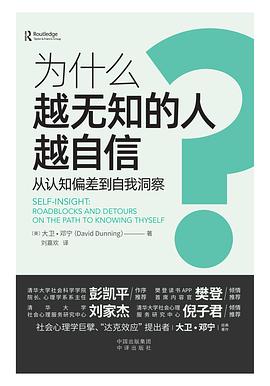WULOLIFE
《为什么越无知的人越自信》作者: 〔美〕大卫·邓宁(David Dunning)出版社: 中译出版社
《为什么越无知的人越自信》作者: 〔美〕大卫·邓宁(David Dunning)出版社: 中译出版社
Sale
Sold out
Regular price
€24,00 EUR
Regular price
Sale price
€24,00 EUR
Unit price
per
Tax included.
Shipping calculated at checkout.
Couldn't load pickup availability
Description
内容简介· · · · · ·
任何在学校或职场与他人打过交道的人都可能会有这样的印象:不少人对自己的认知偏离了客观事实。心理学家大卫·邓宁对这种现象展开了深入研究,并与贾斯汀·克鲁格共同提出了“邓宁-克鲁格效应”(比如:在一项任务中,表现差劲的人会倾向于认为自己比实际情况更加优秀,而表现优秀的人会倾向于低估自己的表现。在本书中,邓宁教授全面总结了关于自我认知的研究成果,分析了为何我们在个人能力和品性两个方面会倾向于形成认知偏差,并揭示了避免这些认知偏差的途径。
本书第一部分讨论了人们关于自我能力的错误评价,并探索了为何人们经常认识不到自己的能力不足和性格缺陷。第二部分讨论了人们关于自己品格的错误评价,并探索了人们为何倾向于认为自己比实际更具独特性、为何对自己的道德品质倾向于做出不切实际的乐观判断,以及为何没能预先得知情绪对他们的选择和行动所具有的影响。
作者简介· · · · · ·
大卫·邓宁(David Dunning 2%
他的研究主要关注人类错误信念背后的心理机制。他在自己最为人所熟知的著作中指出,人们倾向于对自己的能力、性格和前景持有不受客观证据支持的乐观判断——这一现象对健康、教育、工作和经济交流等具有重要影响(即“达克效应”)。
